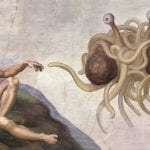 Movies and TV
Movies and TV  Movies and TV
Movies and TV  History
History 10 Things You Never Knew About Presidential First Ladies
 Movies and TV
Movies and TV 10 Zombie Movies That Will Actually Terrify You
 Humans
Humans 10 Times Scientists Were Absolutely Sure… and Absolutely Wrong
 Our World
Our World 10 Pivotal Moments for Life on Earth
 Movies and TV
Movies and TV 10 Most Realistic Medical TV Shows of All Time
 Creepy
Creepy 10 Eerie & Mysterious Ghosts of the Pacific Coast
 Weird Stuff
Weird Stuff 10 Typos That Accidentally Changed History
 History
History 10 Times Trickery Won Battles
 Technology
Technology 10 Awesome Upgrades to Common Household Items
 Movies and TV
Movies and TV 10 Movie Flops That Found Their Way to Cult Classic Status
 History
History 10 Things You Never Knew About Presidential First Ladies
 Movies and TV
Movies and TV 10 Zombie Movies That Will Actually Terrify You
Who's Behind Listverse?

Jamie Frater
Head Editor
Jamie founded Listverse due to an insatiable desire to share fascinating, obscure, and bizarre facts. He has been a guest speaker on numerous national radio and television stations and is a five time published author.
More About Us Humans
Humans 10 Times Scientists Were Absolutely Sure… and Absolutely Wrong
 Our World
Our World 10 Pivotal Moments for Life on Earth
 Movies and TV
Movies and TV 10 Most Realistic Medical TV Shows of All Time
 Creepy
Creepy 10 Eerie & Mysterious Ghosts of the Pacific Coast
 Weird Stuff
Weird Stuff 10 Typos That Accidentally Changed History
 History
History 10 Times Trickery Won Battles
 Technology
Technology 10 Awesome Upgrades to Common Household Items
Top 10 Books that Changed the World
This topic is a very subjective one, and I realise that there will be many disagreements with my selected 10 books. Feel free to add any additional books with a reason, to the comments field. You may even want to contribute a much larger list for future inclusion on the site.
In order of creation, here is the list of top 10 books that changed the world.
10 The Bible – Various Authors (circa 30AD – 90AD)
There can be no doubt that the Bible has done more to change the face of the world than any other book. A mere two hundred years after it was created, it brought about the conversion of the entire Roman Empire from paganism to Christianity. Since then, Christianity has become the largest single religion in the world (with 2.1 billion adherents). The oldest and largest of the Christian groups is the Roman Catholic Church whose membership (1.05 billion) is equal to the size of all other Christian groups combined.
The Bible comprises two books – the Old Testament (taken from the Greek edition used by Christ and the apostles) and the New Testament (written by some of the Apostles of Jesus after his death – including St Paul who did not meet Christ during His lifetime).
The Gutenberg bible (a copy of the Latin Vulgate) was the first book ever published on the printing press. The Bible is the most purchased book in the world.
Or delve deeper into the mysteries of the Bible than ever before with From Eden to Exile: Unraveling Mysteries of the Bible at Amazon.com!
9 The Qur’an – Various Authors (650AD to 656AD)
The Qur’an is the holy book of the Islamic religion. The founder of Islam, Mohammed told his followers that he was given revelations by the Angel Gabriel. These revelations (spanning 23 years) form the basis of the Qur’an. After Mohammed’s death in 632 the Qur’an was recorded by word of mouth only; it was not for another 20 years that the various memories of his words were collected and combined.
The Qur’an is considered by Muslims to be the last revealed word of God (after the Old Testament and the New Testament of the Christian Bible). In recent years much debate has occurred over the content of the Qur’an – with its opponents claiming that it advocates war and murder of non-believers. Muslims generally claim that this is not the case and state that opponents of Islam are taking the text out of context.
8The Summa Theologica – St. Thomas Aquinas (1265 – 1274)
The Summa Theologica is a multi-volume set of books which outlines in the most precise manner, the doctrines and beliefs of Christianity. It was held in such high regard, that second to the Bible, it was the book most used for reference at the Council of Trent (1545 – 1563). Its influence was felt all across the Christian World as the reforms of the Council of Trent were implemented.
To this day, the Summa Theologica is the primary teaching tool used in Roman Catholic seminaries and its author is regarded as a Doctor of the Church (a title reserved for only 33 great thinkers in the history of Christianity). It is also worth noting that St Isidore (popularly considered Patron Saint of the Internet) is also seen as a Doctor of the Church.
Buy the Summa Theologica at Amazon.com
7 The Rights of Man – Thomas Paine (1791)
Paine, an English writer, influenced American Democracy and Democracy in general with his writings. According to Paine, the sole purpose of the government is to protect the irrefutable rights inherent to every human being. Thus all institutions which do not benefit a nation are illegitimate, including the monarchy (and the nobility) and the military establishment.
When the French Revolution broke out, Paine went to France where, despite his ignorance of the French language, he was promptly elected to the National Convention. His absence from England at this time was fortuitous because the publication of The Rights of Man caused such a furor in the country that Paine was put on trial in absentia and convicted for seditious libel against the crown.
Buy The Rights of Man at Amazon.com
6 Either/Or – Søren Kierkegaard (1843)
Either/Or portays the two lifeviews, one being consciously hedonistic and one based on ethical duty and responsibility, in two volumes. Each lifeview is written and represented by a fictional pseudonymous author and the prose of the work depends on which lifeview is being discussed. For example, the aesthetic lifeview is written in short essay form, with poetic imagery and allusions, discussing aesthetic topics such as music, seduction, drama, and beauty. The ethical lifeview is written as two long letters, with a more argumentative and restraint prose, discussing moral responsibility, critical reflection, and marriage.
This book, by the father of existentialism has been highly influential with other existentialists. Despite its great popularity, it was not published in English until 1944. Existentialism is a philosophical movement that claims that individual human beings have full responsibility for creating the meanings of their own lives. It is a reaction against more traditional philosophies, such as rationalism and empiricism.
5Communist Manifesto – Karl Marx and Friedrich Engels (1848)
This tract, written by communist theorists Karl Marx and Friedrich Engels at the behest of the Communist League, has become one of the most influential political tracts in history. The Manifesto suggested a course of action for a proletarian (working class) revolution to overthrow the bourgeois social order and to eventually bring about a classless and stateless society.
Perhaps the most famous quote from the work reads: “The Communists disdain to conceal their views and aims. They openly declare that their ends can be attained only by the forcible overthrow of all existing social conditions. Let the ruling classes tremble at a communist revolution. The proletarians have nothing to lose but their chains. They have a world to win. Working men of all countries, unite!”
Buy the Communist Manifesto at Amazon.com
Impress your friends with your intricate knowledge of communism after you read The Black Book of Communism: Crimes, Terror, Repression at Amazon.com!
4Experimental Research in Electricity – Michael Faraday (1855)
Faraday was an English chemist and physicist whose many experiments with electricity ultimately lead to his invention of electromagnetic rotary devices which formed the foundation of electric motor technology. Although he received little formal education and thus higher mathematics like calculus were always out of his reach, he went on to become one of the most influential scientists in history. It was largely his experiments that lead to electricity becoming viable for use in technology.
During his lifetime, Faraday rejected a knighthood and twice refused to become President of the Royal Society. He died at his house at Hampton Court on August 25, 1867. He has a memorial plaque in Westminster Abbey, near Isaac Newton’s tomb, but he turned down burial there and is interred in the Sandemanian plot in Highgate Cemetery.
Buy Experimental Researches in Electricity at Amazon.com
3 On the Origin of Species – Charles Darwin (1859)
This book by Darwin is considered a seminal work in the field of evolutionary biology. It proposes that over time, through natural selection, species evolve. It was a highly controversial book as it contradicted many religious views on biology at the time. Darwin’s book was the culmination of evidence he had accumulated on the voyage of the Beagle in the 1830s and expanded through continuing investigations and experiments since his return to England.
The book is readable even for the non-specialist and attracted widespread interest on publication. The book was controversial, and generated much discussion on scientific, philosophical, and religious grounds. The scientific theory of evolution has itself evolved since Darwin first presented it, but natural selection remains the most widely accepted scientific model of how species evolve. The at-times bitter creation-evolution controversy continues to this day.
Buy On the Origin of Species at Amazon.com
2 The Second Sex – Simone de Beauvoir (1949)
The Second Sex is the best known work of Simone de Beauvoir. Beauvoir wrote the book after attempting to write about herself. The first thing she wrote was that she was a woman, but she realized that she needed to define what a woman was, which became the intent of the book. It is a work on the treatment of women throughout history and often regarded as a major feminist work. In it she argues that women throughout history have been defined as the “other” sex, an aberration from the “normal” male sex.
Simone de Beauvoir (a pioneer of the feminist movement) argues that women have historically been considered deviant, and abnormal. She submits that even Mary Wollstonecraft considered men to be the ideal toward which women should aspire. Beauvoir says that this attitude has limited women’s success by maintaining the perception that they are a deviation from the normal, and are outsiders attempting to emulate “normality”. For feminism to move forward, this assumption must be set aside.
Buy The Second Sex at Amazon.com
1 Atlas Shrugged – Ayn Rand (1957)
Atlas Shrugged was Rand’s last work before she devoted her time exclusively to philosophical writing. This book contains a variety of themes that would later become the core of her philosophy Objectivism. She considered it to be her magnum opus and is it the most popular of her non-fiction work.
While the book was largely a critical failure, it had an enormous poplar success. As far as influence in the world, the Objectivist philosophy gave much to the Libertarian movement which has enjoyed great popularity around the world.
In a three-month online poll of reader selections of the hundred best novels of the twentieth century, administered by publisher Modern Library, Atlas Shrugged was voted number one. She has a large following in the celebrity world, including Brad Pitt and Angelina Jolie who have been selected to play the two main characters in a trilogy of films that aims to bring Atlas Shrugged to the silver screen in the near future.
Buy Atlas Shrugged at Amazon.com







